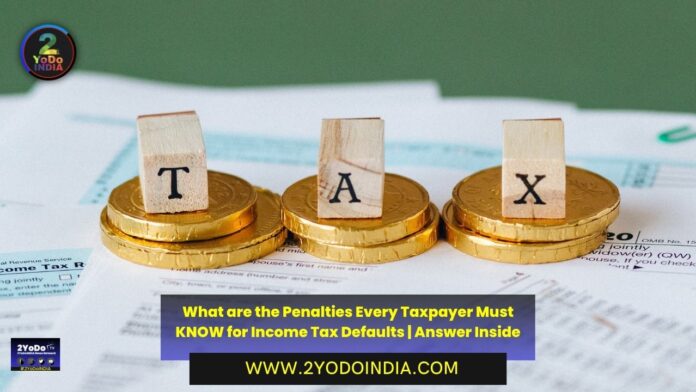The due date for filing an income tax return (ITR) for the financial year 2023 is 31st July, 2023. As per the Income-Tax Act, many penalties are levied for various defaults commit by the taxpayer.
Some of the penalties are mandatory and a few are at the discretion of the tax authorities.
What are the Penalties Every Taxpayer Must KNOW?
Late filing fees for delay in filing the TDS/TCS statement
As per section 200(3), every person liable to deduct tax at source is liable to file the statement in respect of tax deducted by him i.e. TDS return.
As per provison to section 206C(3) every person liable to collect tax at source has to furnish statement in respect of tax collect by him i.e. TCS return.
Section 234E provides for levy of late filing fees for the delay in filing TDS/TCS return.
As per section 234E, where a person fails to file the TDS/TCS return on or before the due date prescribe in this regard, then he shall be liable to pay, by way of fee, a sum of Rs. 200 for every day during which the failure continues.
The amount of late fees shall not exceed the amount of TDS/TCS.
TDS/TCS return cannot be file, after prescribe due date without payment of late filing fees.
Fee for default in furnishing return of income
If assessee who is require to furnish return of income under section 139 fail to furnish return of income within the due date as prescribe under section 139(1) then as per section 234F, he will be require to pay a fee of Rs. 5,000 if the return has been furnish after the due date prescribe under section 139(1).
It shall be Rs 1,000 if the total income of an assessee does not exceed Rs 5 lakh.
Penalty for underreporting and misreporting of income
Many times a taxpayer may try to reduce his tax liability by underreporting or misreporting of income.
In such a case, by virtue of Section 270A, the taxpayer will be held liable for penalty.
The rate of penalty shall be 50% of the tax payable on under-reported income.
In a case where under-reporting of income results from misreporting of income, the taxpayer shall be liable for penalty at the rate of two 100% of the tax payable on such misreport income.
Penalty for failure to keep maintain or retain books of account and others.
For the purpose of Income-tax Act, a taxpayer is require to maintain the books of account as provided in section 44AA.
If the taxpayer fails to maintain books of account as per the provisions of section 44AA, then he shall be liable to pay penalty under section 271A.
Penalty under section 271A is Rs 25,000.
Penalty for ‘false entry’ in the books of account
The Finance Act 2020 has introduce a new section 271AAD under the Act to provide for a levy of penalty on a person if, during any proceedings under the Act, it is found that in the books of accounts maintained by him, there is :
- A false entry; or
- Any entry relevant for computation of total income of such person has omitted to evade tax liability.
The penalty payable by such person shall be equal to the aggregate amount of false entries or omitted entry.
It is also provide that any other person, who causes in any manner a person to make or cause to make a false entry or omits or causes to omit any entry, shall also pay by way of penalty a sum which is equal to the aggregate amount of such false entries or omitted entry.
For the purpose of section 271AAD, the false entries to include use or intention to use :
- Forged or falsified documents such as a false invoice or, in general, a false piece of documentary evidence;
- Invoice in respect of supply or receipt of goods or services or both issued by the person or any other person without actual supply or receipt of such goods or services or both; or
- Invoice in respect of supply or receipt of goods or services or both to or from a person who does not exist.





